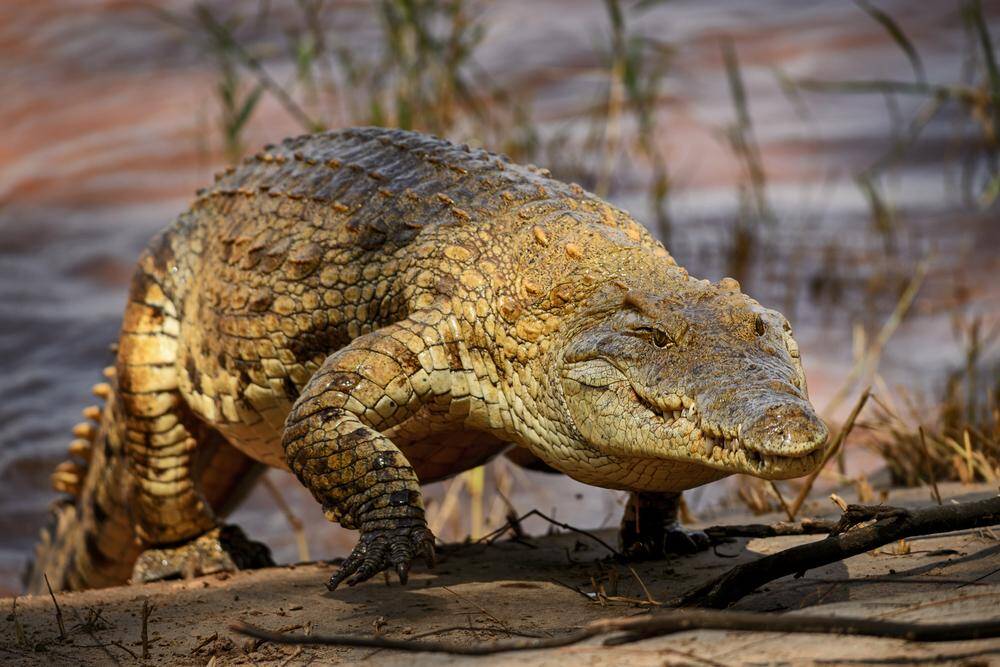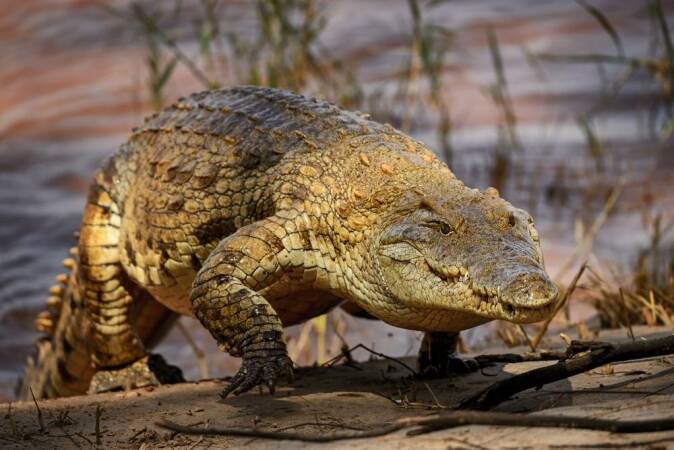

Crocodile hunting in Africa offers a unique challenge for hunters seeking to engage with one of the continent’s most formidable predators. The Nile crocodile (Crocodylus niloticus), a prominent member of Africa’s “Dangerous 7,” is renowned for its stealth and power, making it a coveted trophy in dangerous game hunting.
African Crocodile Subspecies
Africa is home to several crocodile subspecies, some of which are currently threatened:
The Nile Crocodile: Apex Predator
The Nile crocodile stands out as a prime target for hunters due to its:
These attributes solidify its status as a top predator in its habitat.
Conservation Status
While the Nile crocodile is not currently listed as endangered, other African crocodile species face significant threats. Factors such as habitat loss, hunting, and human encroachment have led to declining populations, particularly for the West African slender-snouted crocodile and the dwarf crocodile. Conservation efforts are crucial to ensure the survival of these species.
Hunting Considerations
When planning a crocodile hunting safari in Africa, consider the following:
Engaging in crocodile hunting not only provides a challenging experience but also requires a deep respect for these ancient reptiles and their role in Africa’s ecosystems.
Name:
Crocodylus Niloticus
Male Weight:
485-2,200 pounds
Male Shoulder Height:
11-16 feet
Range:
Found in 26 African countries
Mating Season:
Late June to mid-August
Life span:
50-60 years
Crocodiles are the Perfect Cold Blooded Hunting Prize
The Nile crocodile has a broad snout that is more noticeable on older animals and is a large, extremely aggressive, and cold-blooded reptile not capable of feeling any pain. These crocodiles are native to African freshwater habitats and are present in twenty-six countries. The adult male crocodile is 11-16 feet and can weigh up to 2,200 pounds. Nile crocodiles have an extremely powerful bite, with a death grip that is almost impossible to prise free. This grip works in their favor, especially when they perform their famous “death roll” of holding and rolling an animal underwater until they die.
Measuring up eye-to-eye with the Nile crocodile on your game hunting safari, it is easy to see why this apex predator, sporting 64-68 razor-sharp teeth, doesn’t have many natural predators. If you don’t experience goosebumps while up close and personal with this prehistoric killing machine, are you even looking at a Nile crocodile? While you are on your hunting safari in Africa and you make the shot and harvest the crocodile, it is a feeling that will stay with you forever. The sense of achievement, the adrenaline rush, and the knowledge that you have managed to kill one of the greatest apex predators worldwide! It’s priceless and a great reward for a job well done!
Crocodiles are often hunted from blinds as the Nile crocodile can feel vibrations of animals coming, and once they hear you, they are under the water in seconds. This makes the walk-and-stalk method rather challenging!
This member of the dangerous seven needs to be hunted with an accurate, high-powered rifle. Shots will be at the brain, through a thick skull, or the vertebrae. A 7mm. 300-win mag or .375 is highly recommended, especially when hunting larger crocodiles.
Embarking on a crocodiles hunting safari in Africa is an adventure like no other. These formidable reptiles, renowned for their strength and stealth, offer a unique and challenging hunting experience. Whether you are a seasoned hunter or new to dangerous game hunting, crocodiles hunting in Africa promises an unforgettable pursuit of one of nature’s most resilient predators.
Crocodiles hunting requires a deep understanding of these apex predators’ behavior and habitats. Unlike other big game, crocodiles are highly territorial and spend much of their time submerged in water, making them elusive targets. Successful crocodiles hunting hinges on patience, precision, and the ability to adapt to their unpredictable movements.
Africa boasts several prime locations for crocodiles hunting, each offering distinct environments and challenges:
Successful crocodiles hunting involves a combination of strategic planning and on-the-ground tactics:
Proper gear is crucial for a successful and safe crocodiles hunting experience:
Crocodiles hunting must be conducted responsibly to ensure the sustainability of crocodile populations and the preservation of their habitats:
Preparation is key to a successful crocodiles hunting adventure. Here are essential steps to ensure you are ready:
Safety should always be a top priority during crocodiles hunting. Implement these measures to ensure a safe hunting experience:
Crocodiles hunting offers unique rewards that go beyond the thrill of the chase:
Crocodiles hunting plays a vital role in conservation efforts. By participating in regulated hunts, hunters contribute to the management and preservation of crocodile populations. Sustainable hunting practices ensure that crocodiles remain a part of Africa’s rich biodiversity for future generations to appreciate and pursue.
Crocodiles hunting in Africa is a challenging and rewarding pursuit that tests the limits of a hunter’s skills and endurance. With the right preparation, ethical practices, and respect for these incredible predators, crocodiles hunting can be an unforgettable experience that leaves a lasting impact. Embrace the adventure and master the art of crocodiles hunting in Africa’s untamed landscapes.
Crocodiles hunting involves tracking and hunting various species of crocodiles in their natural habitats across Africa. It requires specialized skills, equipment, and knowledge of crocodile behavior.
Prime locations include the Nile River in Tanzania, the Okavango Delta in Botswana, the Zambezi River in Zimbabwe, and the Limpopo River in Mozambique. Each offers unique environments and abundant crocodile populations.
Essential equipment includes a high-powered rifle (.375 caliber or larger), quality optics and scopes, protective gear, baiting tools, and reliable communication devices.
The best time for crocodiles hunting is during the dry season, typically from July to September, when crocodiles are more active and easier to locate near water sources.
Yes, hunters must obtain the necessary permits and licenses specific to each country. It’s important to comply with local hunting regulations and conservation laws.
Safety measures include hunting with experienced guides, carrying communication devices, having a first aid kit, and maintaining awareness of the surroundings to avoid dangerous encounters.
Responsible crocodiles hunting helps manage crocodile populations, funds conservation projects, and supports habitat protection efforts, ensuring the sustainability of crocodile species.
Effective techniques include boat hunts, using blinds or stands near water edges, tracking and stalking, and conducting night hunts to take advantage of crocodiles’ nocturnal activity.
Yes, Africa is home to several crocodile species, including the Nile crocodile, West African slender-snouted crocodile, Dwarf crocodile, and West African crocodile. Each species offers unique hunting challenges.
On a crocodiles hunting safari, expect to navigate diverse African waterways, engage in strategic hunting techniques, and experience the thrill of tracking and harvesting one of nature’s most formidable predators.
Search from our range of Hunts across various popular destinations in Africa.
Find A Hunt